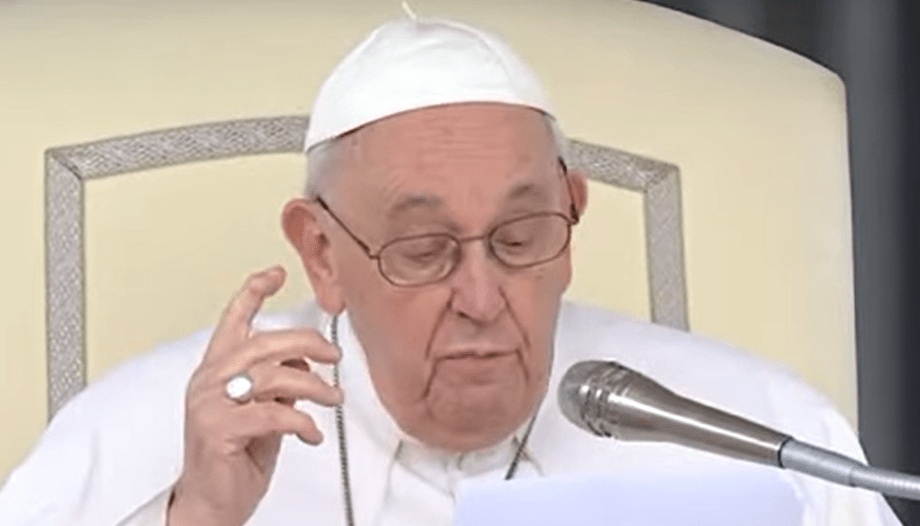On International Women's Day, Pope Francis had words of thanks and praise for women at the end of the general audience held in St. Peter's Square. "A special blessing for all the women in the square - and a round of applause for the women! They deserve it!" said the Holy Father. The theme of catechesis has been 'The Second Vatican Council. Evangelization as service', continuing the cycle on 'The passion of evangelization. The apostolic zeal of the believer'.
For some days now, the Pope has been referring to women in various audiences to smaller groups, as well as in publications. He has done so, for example, in the preface to the volume 'More Women's Leadership for a Better World: Care as the Motor of Our Common Home', the fruit of a research project promoted by the Centesimus Annus Foundation pro Pontifice, presiding Anna Maria Tarantolaand the Strategic Alliance of Catholic Research Universities (Sacru), published by 'Vita e Pensiero'.
In this preface, the Holy Father wrote that "man does not bring harmony: it is she. It is she who brings that harmony which teaches us to caress, to love tenderly and which makes the world a thing of beauty" (Homily at Santa Marta, February 9, 2017)." And "we are in great need of harmony to fight injustice, blind greed that harms people and the environment, unjust and unacceptable war," he said. Vatican News.
Moreover, Francis adds that "women know that they give birth with pain in order to achieve a great joy: to give life and to open vast new horizons. That is why women always desire peace. Women know how to express both strength and tenderness, they are good, competent, prepared, they know how to inspire new generations (not only their children). It is only fair that they should be able to apply these skills in all areas, not only in the family, and that they should receive the same remuneration as men with equal functions, commitment and responsibility. The differences that still exist are a grave injustice".
In this line of peace, the Pope referred once again in the Audience to the "pain of the martyred Ukrainian", who "suffers so much". Earlier, at the conclusion of the intervention of the Polish nun, he had thanked the people of Poland for "welcoming" the Ukrainian refugees fleeing the war.
"Called to evangelize".
In the first part of the Audience, Pope Francis focused his evangelizing catechesis on the Second Vatican Ecumenical Council, which "presented the Church as the People of God on pilgrimage in time and by its nature missionary (cfr. Ad gentes Decree What does this mean?" he asked.
"There is a bridge between the first and the last Council, in the sign of evangelization, a bridge whose architect is the Holy Spirit. Today we listen to the Second Vatican Council, to discover that evangelization is always an ecclesial service, never solitary, never isolated or individualistic. Evangelization is always done in the Church, and without proselytizing, because that is not evangelization", he pointed out.
The core of his message, which the Pope himself later summarized, has been
that "the pilgrim and missionary People of God", as the Second Vatican Council presented the Church, "those of us who are part of this holy People - are all the baptized - we are called to evangelize. And what we transmit is what we, in turn, have received. This dynamism guarantees the authenticity of the Christian message. Evangelizing is not a solitary or individual task, but an ecclesial service".
"Christian vocation of every baptized person."
"Every baptized person participates in the mission of Christ," the Holy Father added in various ways. "That is, he is sent to proclaim the Good News, loving and serving others to the point of giving his own life. This means that we cannot remain passive subjects or mere spectators; apostolic zeal impels us to seek ever new ways of proclaiming and witnessing to God's love. It also urges us, following the example of Christ, to give concrete responses to console our suffering brothers and sisters.
"Each of the baptized, whatever his function in the Church and the degree of enlightenment of his faith, is an agent of evangelization" (Apostolic Exhortation Evangelii Gaudium, 120)," the Pope reiterated. "By virtue of the Baptism received and the consequent incorporation into the Church, every baptized person participates in the mission of the Church and, in it, to the mission of Christ the King, Priest and Prophet. This duty 'is unique and identical everywhere and in all conditions, even if it is not carried out in the same way according to circumstances' (AG, 6)." "If you are not an evangelizer, if you do not bear witness, you are not a good Christian," the Pope added, going off script.
"Creative search for new ways"
"This invites us not to become sclerotic or fossilized; the missionary zeal of the believer is also expressed as a creative search for new ways of proclaiming and witnessing, for new ways of encountering the wounded humanity that Christ took upon himself. In short, new ways of serving the Gospel and humanity," the Holy Father said.
"Returning to the fundamental love of the Father and to the missions of the Son and the Holy Spirit does not lock us into spaces of static personal tranquility. On the contrary, it leads us to recognize the gratuitousness of the gift of the fullness of life to which we are called, a gift for which we praise and thank God. It is to be given, not only for ourselves.
The Roman Pontiff concluded: "Let us ask the Lord for this grace to take this Christian vocation seriously and to thank the Lord for this treasure that he has given us, and to try to communicate it to others".









